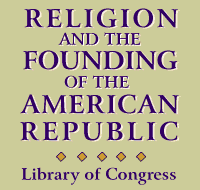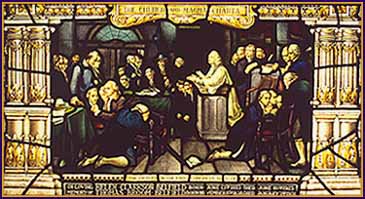Public Programs
Exhibition Overview
Object Checklist
EXHIBITION SECTIONS
- America
as a Religious Refuge: The Seventeenth Century
- Religion
in Eighteenth-Century America
- Religion
and the American Revolution
- Religion
and the Congress of the Confederation, 1774-89
- Religion
and the State Governments
- Religion
and the Federal Government
- Religion
and the New Republic
Credits
|

(Adam2.org Note: This is a mirror site for the
religion exhibition
found at the Library of Congress. It is provided for
the benefit and convenience of our users. Please click on the "credits"
link at left and below to view those whose tireless work made this
exhibition possible.)
INTRODUCTION

This exhibition demonstrates that many of the
colonies that in 1776 became the United States of America were settled by
men and women of deep religious convictions who in the seventeenth century
crossed the Atlantic Ocean to practice their faith freely. That the
religious intensity of the original settlers would diminish to some extent
over time was perhaps to be expected, but new waves of eighteenth century
immigrants brought their own religious fervor across the Atlantic and the
nations first major religious revival in the middle of the eighteenth
century injected new vigor into American religion. The result was that a
religious people rose in rebellion against Great Britain in 1776, and that
most American statesmen, when they began to form new governments at the
state and national levels, shared the convictions of most of their
constituents that religion was, to quote Alexis de Tocquevilles
observation, indispensable to the maintenance of republican institutions.
The efforts of the Founders of the American nation to define the role of
religious faith in public life and the degree to which it could be
supported by public officials that was not inconsistent with the
revolutionary imperatives of the equality and freedom of all citizens is
the central question which this exhibition explores.

|

